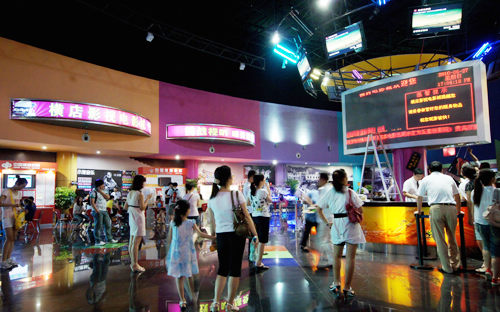|
 |
|
BOOMING BOX OFFICE: Moviegoers buying tickets at a cinema in Zhengzhou, Henan Province, on June 27, 2010. Box office revenue in China reached 4.6 billion yuan ($730 million) in 2010 (CFP) |
On January 30, Bona Cinema, a leading Chinese cinema group, announced on its micro-blog that the cinema was going to introduce a "film rating system," which immediately aroused a heated discussion. But Bona Cinema soon deleted the post and explained the so-called "rating system" would not be an industry standard but merely a guiding service for audiences. Details of the services are still unknown.
For several years Chinese movie insiders have been discussing the possibility of adopting a film rating system in the domestic market. But there are so many controversies that no conclusions have been made yet.
At present, China uses a film censorship system instead of a rating system to restrict the content of movies that are going to be shown in cinemas. The government argued it is unnecessary to adopt this kind of system because the improper content or movies can be deleted or banned before showing. Therefore, some films that may contain strong graphic violence with blood and gore, sex scenes or other elements can never be seen in cinemas or on the Internet in China.
However, some contents may still garner an unpleasant response from the audiences, particularly children and the elderly. For example, it is frequently reported that some kids were scared of the dark and horror plots of the blockbuster Harry Potter series in cinemas. Therefore, many parents, cinema managers and movie directors have called for an official film rating system in the Chinese market.
Although both the public and cinema insiders call for a film rating system, the State Administration of Radio, Film and Television (SARFT) has never issued any official regulations about film rating, because all parties involved in the movie industry have not reached consensus on the final decision on how to make a unified rating system.
On August 19, 2010, Zhao Shi, the then Vice Minister of SARFT, said at a press conference, "It is not proper to implement a film rating system in the Chinese market."
Zhao said research in the domestic market showed that in theory the film rating system could not meet different needs of differentiated audiences. In practice the rating system was not successful even in developed markets abroad. It also could not prevent children and teenagers from watching films through other means including the Internet and home video.
Furthermore, the latest draft of the Promotion Law of Film Industry published in December 2011, did not mention anything about a film rating system, which ended up the long-argued topic.
In order to prevent misunderstandings, Bona Cinema clarified the facts.
"To be specific, our cinemas are going to offer a service that gives a guide for parents and their children to watch films," said Jin Bo, Operation Manager of Bona Cinema in Beijing.
"The film watching guide is not an industry standard but just a service provided by Bona," emphasized Jin. "The guide service is designed to help parents decide whether a movie is suitable for their children. We will make such suggestions for audiences when they buy tickets. But it is up to them whether to watch the movie."
With regard to when the guide service will be launched, Jin said it is still under preparation and will be offered in a few months.
| 